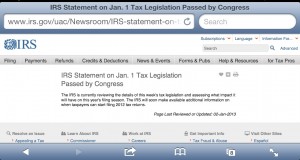Only wealthy people benefit from the “loophole” anyways. Retirement plans were never intended to be an estate planning tool. It won’t impact me. I don’t care. These are some of the comments in the press right now regarding proposed legislation to end the ability of heirs to take inherited IRAs out over their life expectancies (referred to as “stretch IRAs”).
You should care. My experience is the less wealthy actually benefit as much or more than the truly wealthy from stretch IRAs. For example, lets call my client Mike. Mike’s father left him and his sister each half of his IRA at death. Neither Mike nor his sister would be considered even close to wealthy. Fortunately for Mike and his sister, they now use their required minimum distributions from their stretch IRAs to help pay their mortgages on humble homes. Had they been forced under the proposed legislation to withdraw all stretch IRA funds within five years of their father’s death, I’m sorry to say they probably would have nothing remaining to help them survive in the future. This is at least partially due to the behavioral finance implications of the tax-deferred nature of the stretch IRA. It provides a barrier to the instant gratification impulse of most people to consume the funds immediately. If they know they can let the stretch IRA grow tax-deferred but take a minimum amount each year, the long-term incentive is enough to overcome the short-term urge.
Why shouldn’t retirement plans be an estate planning tool? Is it better for the government to force citizens to cash in stretch IRAs or allow them to grow tax-deferred? I vote for saving incentives not consumption requirements. If the stretch IRA owner were forced to liquidate the account under the proposed legislation, they could still invest the after-tax amount. However, due to human nature this generally does not happen. They spend it on unnecessary stuff!
What can you do to help protect the stretch IRA? Contact your Representative and Senators and let them know you prefer saving incentives over forced consumption. In the interim, you should check your retirement plan beneficiaries and make certain your intentions are documented correctly. Other than that, we’ll all have to wait and see.

 Estate Tax
Estate Tax